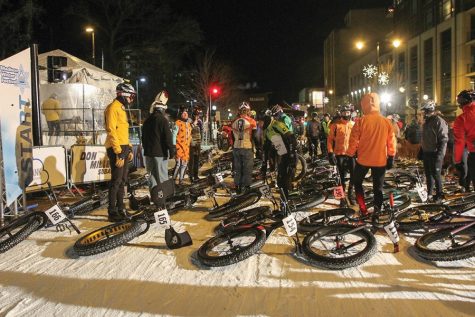Bigger tires allow you to keep riding all year long
December 8, 2016
A flock of bicycles with huge, fat tires roars down Madison’s bike paths, cruises through snow, glides across ice, flies down mountain bike trails, and causes bystanders to stare in amazement.
These “fat bikes,” categorized as having tires that are at least 3.8 inches wide, have only become mainstream in the past two years in Madison. When James Syverud, Fat Bike Ambassador for the Capital Off Road Pathfinders (CORP), first began fat biking about four years ago, he says that there were only about 10 to 12 other fat bikers in the Madison area. Now, he sees 10 to 12 riders each time he is out on the trails.
Jeff Fitzgerald, owner of Revolution Cycles, agrees. He says that the bike shop only sold one to five fat bikes annually until last year. The number has now spiked to 15-20 fat bikes a year. “The only word for it is exponential,” says Fitzgerald.
“It used to be that you put your bike away in the fall because of darkness after work and conditions that made it near impossible to make any headway with the existing bikes and tires,” says Brian Donley, also with CORP. “Then along came 3.8 inch wide tires and bike geometries that made it possible to get ‘float.’ Combined with the advancement of battery and LED technology for lighting the way and we were suddenly able to ride year-round, 24 hours a day.”
Fitzgerald notes that people were skeptical when the first fat bike appeared in Madison around 2008. “People thought it was stupid. Too big to work. They didn’t see any reason for it. They dismissed it,” he says.
Donley, Syverud, and Fitzgerald all say that their uncertainty vanished the first time they got on a fat bike. “I absolutely fell in love with it,” says Syverud. “It felt like I was 5 years old again.”
“The thing that inspired me to try the fat bike is that I like to ride in the snow. I saw the lakes and the parks and all that landscape and couldn’t really ride on it with my mountain bike,” says Fitzgerald. “I was smiling from ear to ear when I could ride on snow!”
 Photo Provided to the Clarion
Photo Provided to the Clarion
Originally designed for riding on snow and sand, many bicyclists have discovered that fat bikes are also good for riding on trails, road rides, and commuting, so long as the rider switches out the tires to match conditions. Donley says, “If I had to choose just one bike that maximized my enjoyment over the broadest set of conditions, it would most definitely be a fatty.”
Syverud says, “These bikes are so versatile. You can go from parking lot at the trailhead down some pavement, then cruise through some sand, into some deep snow, thick weeds, thick mud. Nothing stops it.”
For those looking to get into fat biking, start at a reputable bike shop and test ride some bikes. Fat bikes can be rented at CamRock Café & Sport in Cambridge, Wis., or at Machinery Row Bicycles in Madison. While there are low-end fat bikes available at Blain’s Farm & Fleet or Wal-Mart, Fitzgerald says that the upfront investment is worth it because those bikes start to fall apart under hard use. The cost for a decent fat bike is around $1,000 from the two entry-level brands, Surly and Salsa. Trek and Specialized manufacture carbon fiber bikes that can cost up to $6,000.
Beginners should also connect with CORP at their website, madcitydirt.com. The website has specific forums for “newbies” and fat bikers, as well many other topics. It also lists group rides and events. Revolution Cycles leads a ride every Thursday night around 6:30 p.m., with the routes based on weather and skill levels. Female bicyclists looking for their own scene can get involved with Bell Joy Ride Madison.
For riders who are specifically interested in the gear, the website fat-bike.com has product reviews, webcasts, and additional information about fat bikes. Additionally, Syverud will be holding a clinic at the Madison REI store in January to discuss the clothes and gear needed to get into fat biking.
Fat bikers are known for their enthusiasm and love of the sport, so new riders should feel comfortable reaching out to veterans. As Donley says, “Biking nuts are all about sharing the love, so guided tours of favorite skill-level-specific rides are there for the asking.”
CORP maintains trails for all different skill levels in Dane County. The trails have signs to direct riders and also include options to bail out from steep hills. Syverud believes that these trails are under-utilized and encourages riders to get out and experience them.
“Buy a fat bike,” says Fitzgerald. “Give them a try. People can open up different possibilities. Beginning mountain bike riders can build trail confidence. People who aren’t into winter sports can try something new. You can create your own terrain.”






























